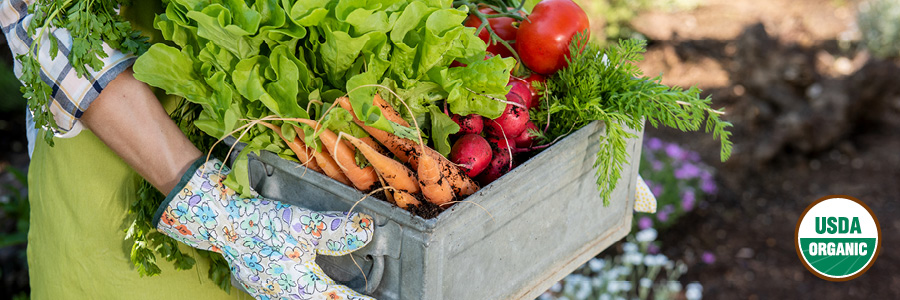


Sign-up for {N}power to get exclusive discounts, newsletters, members-only features, and more!
 Denver - Design District - Alameda and Broadway
Denver - Design District - Alameda and Broadway
368 S Broadway
Denver, CO 80209
United States
 Preferred Store:
Select a Store
Preferred Store:
Select a Store


Organic farming and an organic diet can safeguard and improve the health of the environment and the health of your family, with groundbreaking studies continuing to yield proof of those benefits. This Earth Day, make a resolution to make organic a part of your daily life.
A significant study from 2018 showed that eating an organic diet can reduce your risk of cancer. Researchers compared French adults who frequently consumed organic foods to those who never consumed organic foods and found a 25 percent reduction in overall cancer risk.
More studies are investigating the impacts of organic farming on climate change, and show that choosing organic can help mitigate the release of greenhouse gases while sequestering carbon in the soil.
If you love bird watching or just the sound of birds in the morning, choosing organic is a must. A recent study focusing on birds found that organic farms supported overwintering, and had more species of birds than conventional farms.
Organic is good for the birds … AND the bees. Researchers looking into how farming systems impact wild bees found more flowers around organic farms than conventional farms, likely due to the lack of herbicides used in organic production, and more species of solitary bees and bumblebees.
Organic farms can pump up local economies and improve livelihoods. Studies have found that organic hot spots positively impact local economies and that organic farming not only creates more job opportunities but also more secure, long-term employment opportunities.
Organic decreases the risk of pesticide exposure on food for you and your family and also has some serious health benefits for farmers and farmworkers. The Organic Center brought it all together in a report that details the impacts of the conventional use of synthetic pesticides on farmers and farmworkers—and how organic can be used as a model to decrease this exposure.
Choosing organic is still the best way to support healthy soils, and the organic food that you eat has a direct impact on the earth it was grown in. A recently published long-term study found that organic agriculture improves the physical characteristics of soil compared to conventional farming. Another study showed that organic farming is linked to greater soil health and higher levels of micronutrients compared to conventional farming.
There has recently been a jump in the number of long-term research studies about the benefits of organic farming, and of how organic supports humans and the planet over many years. One study found that the environmental benefits of organic improve over time, and another study showed that as time under organic management increases, so do ecosystem benefits.
In general, eating meat has a higher impact on the environment than a vegetable-based diet. But, if you do decide to eat a burger, think about the best way to minimize your impact on our planet. A study this year looked at the environmental impacts of organic grass-fed beef and non-organic grass-fed beef production and found that organic grass-fed beef production has fewer environmental impacts.
Organic forces us to think outside of the conventional agriculture toolbox. Instead of using toxic, synthetic pesticides and fertilizer, organic farmers have to use innovative solutions to challenges they face in the field. One recent study showed that organic farming promotes overall pest control by supporting beneficial predators.



Sign-up for {N}power to get exclusive discounts, newsletters, members-only features, and more!
